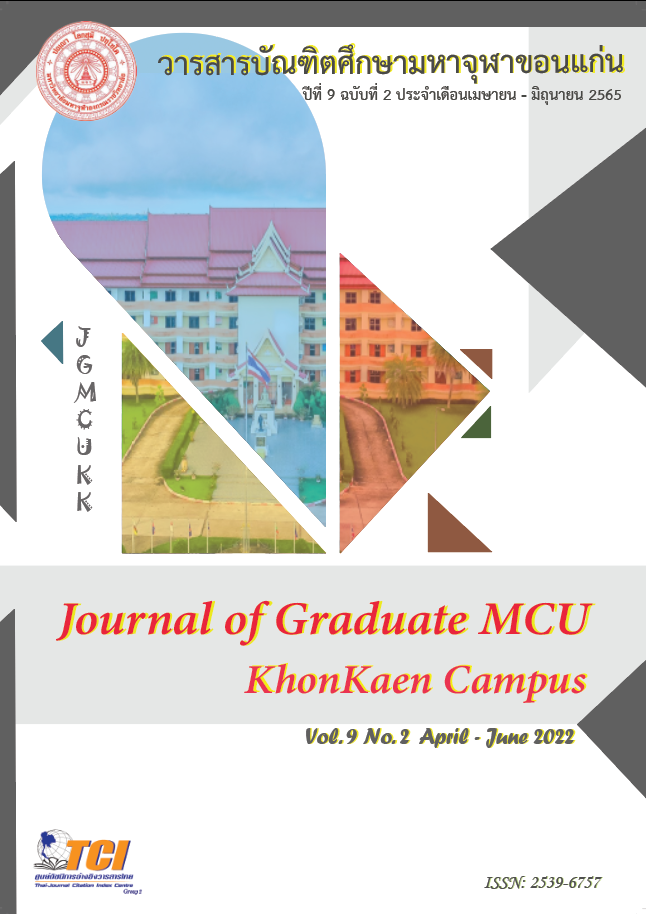Development of Organic Tourism Activities Model by the Community Participatory Learning Process A Case Study of Mae Wa Subdistrict, Thoen District, Lampang Province Development of Organic Tourism Activities Model by the Community Participatory Learning Process A Case Study of Mae Wa Subdistrict, Thoen District, Lampang Province
Main Article Content
Abstract
The objectives of this research were to study, analyze, and survey the potential of community tourist attractions and the development of an organic tourism activity model by a participatory learning process of the community in Mae Wa sub-district, Thoen district, Lampang province. This research was carried out using a qualitative research method. The population used a specific sample selection of 60 people, consisting of 60 members of the Sub-District Administrative Organization, local leaders, the private sector, community leaders, agricultural groups, and the private sector. The research also emphasizes the use of participatory research as a tool to create a collaborative learning process, by jointly searching for organic farming attractions and collecting data from interviews, surveys, observations, group discussions and brainstorming meetings. The data were analysed and synthesised the content according to the topics studied and were then presented in a descriptive form The result of the research found that: The potential of Mae Wa sub-district has a structure that is conducive to tourism management because there are various social capitals in terms of natural resources, local culture, local wisdom, and learning resources, Therefore, led to community-based tourism activities and the development of organic tourism activities through a participatory learning process of the community that is appropriate to the local potential and context, which consist of 12 activities as follows: activity 1: Integrated organic farming learning activity. activity 2: Traditional Rajasthani wild sweet vegetable learning activity. Activity 3: Organic sweet vegetable planting method. activity 4: Community product processing activities from organic sweet vegetables activity 5: Local food activity from native plants activity 6: Arts and crafts activities of loom weaving activity 7: local wisdom on basketry activity, activity 8: herbal massage for traditional health activities, activity 9 cultural and community relations activities, activity 10: nature trail study activities, activity 11: Royal initiatives learning activities. Activity 12 camping and homestay activities, this pattern may be called “MAE WA ORGANIC TOURISM MODEL”. This is a model that experts and communities have assessed and had been approved by the community forum.
Article Details

This work is licensed under a Creative Commons Attribution-NonCommercial-NoDerivatives 4.0 International License.
References
กระทรวงการท่องเที่ยวและกีฬา. (2558). การท่องเที่ยวแบบยั่งยืน. สืบค้นเมื่อ 7 มกราคม 2564, จาก https://www.mots.go.th/
การท่องเที่ยวและกีฬา. (2560). แผนยุทธศาสตร์การพัฒนาแหล่งท่องเที่ยวของประเทศ พ.ศ.2560-2564. กรุงเทพฯ: พีดับบลิว ปริ้นติ้ง.
คณะกรรมการนโยบายการท่องเที่ยวแห่งชาติ. (2561). เเผนพัฒนาการท่องเที่ยวแห่งชาติ ฉบับที่ 2 (พ.ศ.2560-2564). กรุงเทพฯ: สำนักงานปลัดกระทรวงการท่องเที่ยวและกีฬา.
คณะกรรมการนโยบายการท่องเที่ยวแห่งชาติ. (ม.ท.ป). แผนพัฒนาการท่องเที่ยวแห่งชาติ (พ.ศ.2564-2565). สืบค้นเมื่อ 7 มกราคม 2564, จาก https://anyflip.com/zzfck/gopk/
ณัฎฐพงษ์ ฉายแสงประทีป. (2557). รูปแบบและกระบวนการดำเนินธุรกิจการท่องเที่ยวเชิงเกษตร. วารสารวิชาการ Veridian E-Journal บัณฑิตวิทยาลัย มหาวิทยาลัยศิลปากร, 7(3), 310-321.
ธง คำเกิด และคณะ. (2563). การพัฒนาการท่องเที่ยวเชิงเกษตรชุมชนโดยองค์กรแบบพหุภาคี ชุมชนวังยาง จังหวัดสุพรรณบุรี. วารสารวิจัยเพื่อการพัฒนาเชิงพื้นที่, 12(6), 432-450.
นภาพร สิงห์นวล และ พรนภา เตียสุธิกุล. (2564). การศึกษาศักยภาพการจัดการท่องเที่ยวเชิงเกษตรโดยชุมชนบ้านคลองอาราง ตำบลบ้านแก้ง อำเภอเมืองสระแก้ว จังหวัดสระแก้ว. วารสาร มจร สังคมศาสตร์ปริทรรศน์, 10(3), 143-154.
นรินทร์ สังข์รักษา, สมบูรณ์ ยืนยงสุวรรณ และ ญัฐธยาน์ ตั้งถาวรสกุล. (2560). เรื่องการพัฒนาแหล่งท่องเที่ยวเชิงเกษตรชุมชนบ้านดงเย็นในพื้นที่พิเศษเมืองโบราณอู่ทอง. วารสารวิชาการ Veridian E- Journal, Silpakorn University ฉบับภาษาไทย สาขามนุษยศาสตร์ สังคมศาสตร์ และศิลปะ, 10(2), 2161-2172.
มุขสุดา พูลสวัสดิ์ และ ประไพพิศ สวัสดิ์รัมย์. (2563). ศึกษาเรื่องศักยภาพการท่องเที่ยวเชิงเกษตรในพื้นที่เชื่อมโยงเป้าหมาย โดยมีศูนย์ศึกษาการพัฒนาเขาหินซ้อน อันเนื่องมาจากพระราชดำริ จังหวัดฉะเชิงเทรา เป็นจุดศูนย์กลาง. วารสารวิชาการและวิจัยสังคมศาสตร์, 15(3), 45-60.
วารัชต์ มัธยมบุรุษ. (2552). รูปแบบการบริหารจัดการท่องเที่ยวสำหรับนักท่องเที่ยวชาวญี่ปุ่นที่พำนักระยะยาวในจังหวัดเชียงใหม่. เชียงใหม่: มหาวิทยาลัยแม่โจ้.
สุขุม คงดิษฐ์ และคณะ. (2560). ศึกษาเรื่องรูปแบบและกิจกรรมที่เหมาะสมกับการท่องเที่ยวนิเวศเกษตรอย่างมีส่วนร่วมของชุมชนสามเรือน จังหวัดพระนครศรีอยุธยา. วารสารวิจัยเพื่อการพัฒนาเชิงพื้นที่, 9(4), 314-326.
Hron, J. and K. Srnec. (2004). Agrotourim in the context with the rural development. Czech University of lift Sciences Praque. from www.czu.cz.

